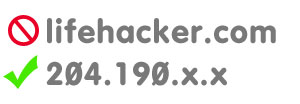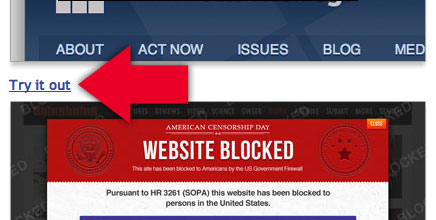See also:
– Ron Paul On SOPA And The NDAA (Video)
– All About SOPA, the Bill That Wants to Cripple Your Internet Very Soon (Life Hacker, Dec 16, 2011):
PROTECT IP / SOPA Breaks The Internet from Fight for the Future on Vimeo.
SOPA, or the Stop Online Piracy Act, is another one of those bills that sounds like it’s going to do something mildly positive but, in reality, has serious potential to negatively change the internet as we know it. It puts power in the hands of the entertainment industry to censor sites that allegedly “engage in, enable or facilitate” copyright infringement. This language vague enough to encompass sites you use every day, like Twitter and Facebook, making SOPA a serious problem. Here’s how it works and what you can do about it.
SOPA’s coming to a vote very soon. In fact, it was supposed to come to a vote today but was delayed, likely because of all the pushback. Reddit users have already started compiling a list of the IP addresses of popular sites in case SOPA passes and access will be restricted within the United States. A decision is going to be made soon, so if you still don’t know what SOPA is or haven’t done anything to stop it, read on to learn how you can help beat the bill.
How Does SOPA Work, and Why Should I Care?
The idea behind SOPA sounds reasonable. It came about in order to try to snuff out piracy online, as the entertainment industry is obviously not excited about the many people downloading their product without their permission. The issue is, however, that it doesn’t really matter whether you’re in support of piracy, against it, or just don’t care. SOPA makes it possible for companies to block the domain names of web sites that are simple capable of, or seem to encourage copyright infringement.
This means that if Lifehacker happened to have an article or two that could be interpreted as piracy-friendly, our domain could be blocked so it’s unaccessible by visiting lifehacker.com. What the bill can’t do is block numeric IP addresses, so you could still access Lifehacker, or any other site that could be censored, if you knew that address. This is important because it means this bill can’t do much to stop downloaders of pirated content. If a domain name is blocked, everything will still work via the numeric IP address. Basically, the bill will be no good at stopping piracy—what it was apparently designed to do—but excellent at censoring any web site capable of providing its users with the means of promoting pirated content or allowing the process. This includes sites like Facebook, Twitter, YouTube, Tumblr, and many more. If it’s possible to post pirated content on the site, or information that could further online piracy, a claim can be brought against it. This can be something as minor as you posting a copyrighted image to your Facebook page, or piracy-friendly information in the comments of a post such as this one. The vague, sweeping language in this bill is what makes it so troubling.
In the event of SOPA-based censorship, any site can submit an appeal so long as they do so within five days. This isn’t a lot of time to handle a legal matter, and if you’ve ever dealt with a copyright infringement takedown notice you know how ineffective an appeal can be. When a threat of legal action is posed, a company is generally going to prefer to err on the side of caution and remove infringing content indefinitely. It’s far cheaper to run the risk of removing perfectly legal content than to battle the issue in court. If your web host censors your site because of a SOPA-based claim, you can expect the same sorts of problems.
If you want to learn more about how SOPA works, the Electronic Frontier Foundation (EFF) posted a great overview. You can also view the exact contents of SOPA. For a quick overview, be sure to watch the video at the top of this post.
What Can I Do About SOPA?
Currently Twitter, Google, Reddit, Kickstarter, Tumblr, Mozilla, Yahoo, AOL, eBay, Zynga, Facebook, and several other sites have spoken out in opposition of SOPA. If you’d like to as well, there are a couple of things you can do.
First, call your congressperson on the phone. This is especially important if you live in Texas, Michigan, Vermont, or Iowa. You can also send a letter to your congressperson by visiting the American Censorship Day web site. To activate the contact widget, you have to click the “Try it out” link that’s wedged between two screenshots of a censored logo and the “Website Blocked” widget you’re trying to open. This will provide you with a form and allow you to send a letter.
Second, get the word out. Post this article, the American Censorship Day web site, or any other information about SOPA on your social media accounts. Send emails to friends and family. If you oppose the bill, help others to understand why they should oppose it as well.
SOPA is on the fast track, so if you want to fight it you need to do so today. We do, however, recommend you get to know the bill so you you can make an informed decision regarding how you feel about it.

